It is unquestionably the Duchess of Sussex’s most famous product, and the one she lovingly refers to on her As Ever website as ‘where it all began’.
Yet, three months on from the public launch of her in-demand raspberry spread, mystery still surrounds the provenance of the £6.50-a-jar product.
There is no indication on the label of the pricey jar – not, technically, a jam because of its high fruit content – as to where it is actually made.
Indeed, one expert has gone so far as to describe it as ‘purposefully vague’.
Such is the deepening mystery around it that, over several months, The Mail on Sunday spoke to scores of jam manufacturers, fruit growers and packaging companies in a bid to track down its origins. Some were close to the £14.5 million Montecito mansion Meghan shares with Prince Harry and their children, Archie and Lilibet. Others were thousands of miles away on the opposite coast of the US.
Intriguingly, despite global publicity and an almost obsessive interest in the spread from Meghan’s fans, the trail went cold.
No one in the industry could shed any light on where the spread comes from – from the berries it contains all the way to its production sites. It leads to an almost inevitable question: What is Meghan trying to hide?
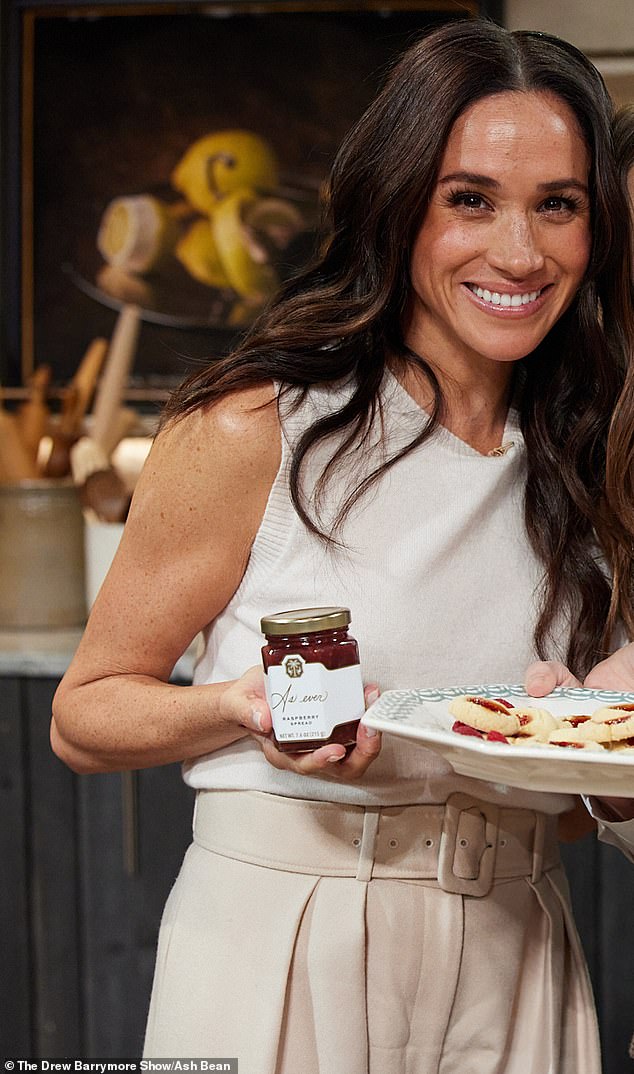
The one thing that seems certain is that it isn’t Meghan producing the vats of product necessary to serve her customers
The Duchess has gone to great lengths to portray the preserve as an artisanal product, with her As Ever website claiming it is ‘inspired by the recipe Meghan crafted in her home kitchen’.
There was an enchanting video posted to her Instagram Stories showing a bubbling pot of the jam and featuring four-year-old Lilibet. Meghan is heard asking, ‘What do you think, Lili?’ to which the adorable toddler responds, ‘I think it’s beautiful.’
The one thing that seems certain is that it isn’t Meghan producing the vats of product necessary to serve her customers. The sheer numbers alone means no one woman could.
After her last ‘product drop’ on June 20, there were half-a-million visits to the As Ever website – the ‘conversion rate’ (the industry term for the proportion of visitors who go on to buy a product) is said to have been three times higher than 2 per cent which is about average for most comparable online food firms.
So why the secrecy? Might the ‘organic’ range have a rather high carbon footprint?
As one professor of sustainability told us: ‘It’s possible the berries are picked in one place, trucked to a jam factory miles away. Then put on another truck and sent to a shipment centre. That’s a large carbon footprint for each tiny jar.’
However, in 2021 on their Archewell website the Sussexes pledged to reach Net Zero carbon emissions by 2030.
Professor Andy Hoffman, of the University of Michigan’s School for Environment and Sustainability, told the MoS that As Ever’s elaborate packaging is an ‘issue’.
Her spreads, for example, come in ‘keepsake’ cylinders – which add £3.50 to the price – and its delivery packing involves another cardboard box with Styrofoam filler. Prof Hoffman says: ‘Packaging is an issue. Consumers are consumers and even if you were claiming sustainability – though as I understand she’s not making any claims about her products being sustainable – you still have to make something people want. This is the marketer’s conundrum.’
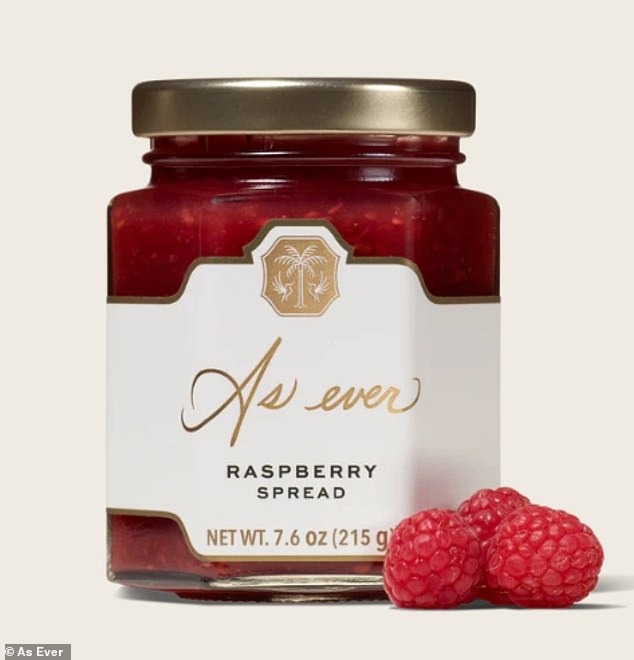
As one professor of sustainability told us: ‘It’s possible the berries are picked in one place, trucked to a jam factory miles away. Then put on another truck and sent to a shipment centre. That’s a large carbon footprint for each tiny jar.’
Meghan has already faced negative publicity when it was revealed this week that her expensive herbal teas are made by The Republic of Tea, a giant US manufacturer, which sells almost identical blends at a third of the price.
Sources close to the Duchess insist any secrecy is perfectly normal when you are dealing with proprietary blends, to prevent other companies from ripping off your recipe. They argue the Republic of Tea story is also unfair because her teas are bespoke and custom-blended.
What those sources have divulged, however, is that the berries for both her raspberry spread and newly-launched apricot spread are Californian-grown and bottled. So who is supplying them?
‘It’s not us,’ laughed Molly Gean, who owns Harry’s Berries, one of California’s top berry growers.
‘Whoever it is will have signed a non-disclosure agreement.’
Another grower suggested berries may be getting picked by illegal migrants who flood into California, mostly from Mexico, during harvest season.
A man picking up the phone at the headquarters of a company that supplies Smucker’s and Welch’s, two of America’s largest jam brands, said: ‘Big companies don’t care but celebrities do. They don’t want people like you poking around and finding out things like who is picking the berries.
‘This is California, there are a lot of undocumented field workers passing through. In the current political climate with [President] Trump ordering illegal migrants to be rounded up, no-one wants a scandal.’
Calls to dozens of other growers were met with ‘no comment’.
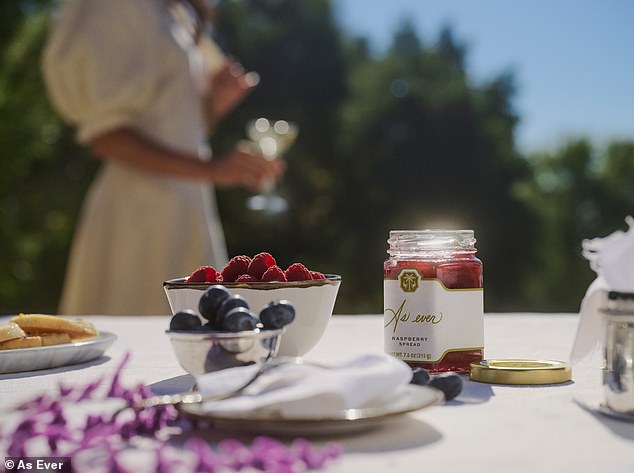
The berries for both her raspberry spread and newly-launched apricot spread are Californian-grown and bottled. So who is supplying them?
Experts we spoke to for our investigation suggest the spread is almost certainly mass-produced, and possibly from a ‘co-packaging’ factory – firms that will put another client’s label on an existing product.
Donna Collins is one of America’s most successful jam makers and has won more than 40 world championships with her ‘Jelly Queens’ brand. She told the MoS: ‘A high-end client might want to give the impression their jams are being made by hand in a country kitchen, while they’re actually made in an industrial warehouse on a sterile production line.’
Pointing to a video Meghan posted on her As Ever Instagram site of the ‘jam’ being made, Ms Collins added: ‘Looking at the video she’s posted, her production looks industrial, not small-scale.
‘Her raspberry spread isn’t touched by a human hand in its entire production. It’s made at scale in a huge vat and cooked quickly, pumped down a pipe and squeezed into jars.’
Non-disclosure agreements (NDA) are signed the moment a celebrity approaches a jam manufacturer, threatening hefty fines if anyone is caught leaking details to the public. A source at a major packing company that deals with celebrities said: ‘The first thing I do after taking a customer’s deposit is sign a mutual NDA.
‘Customers want complete confidence that no-one will ever know their artisanal jams are being made for them under someone else’s name. That applies to everyone, not just celebrities.’
But the mystery around Meghan’s products could also be linked to the fact that – while the Duchess is involved in the development of her products – much of the business side is being handled by streaming giant Netflix.
Meghan chose to team up with Netflix – where she and Harry have a $100 million (£73.3 million) deal that includes her With Love, Meghan cooking show – saying: ‘I had been working towards building my own in-house team but I had a complete U-turn. We are on calls daily, working through product development… and inventory.’
The label on Meghan’s spread lists Netflix’s corporate offices on Sunset Boulevard as its official address, which one jam maker says is ‘purposefully vague’.
Unlike the UK, which has strict laws about listing food products and their origins on labels, the rules are laxer in the US.
The jam maker says: ‘Meghan and Netflix have kept it simple, labelling the products as coming from Netflix means they can source the ingredients from anywhere – as long as they come from within the US. If they buy ingredients from outside the US it has to say so on the label.
‘Legally she can manufacture the jam wherever she wants. It’s what most celebrity brands do. There’s just more scrutiny on her.’
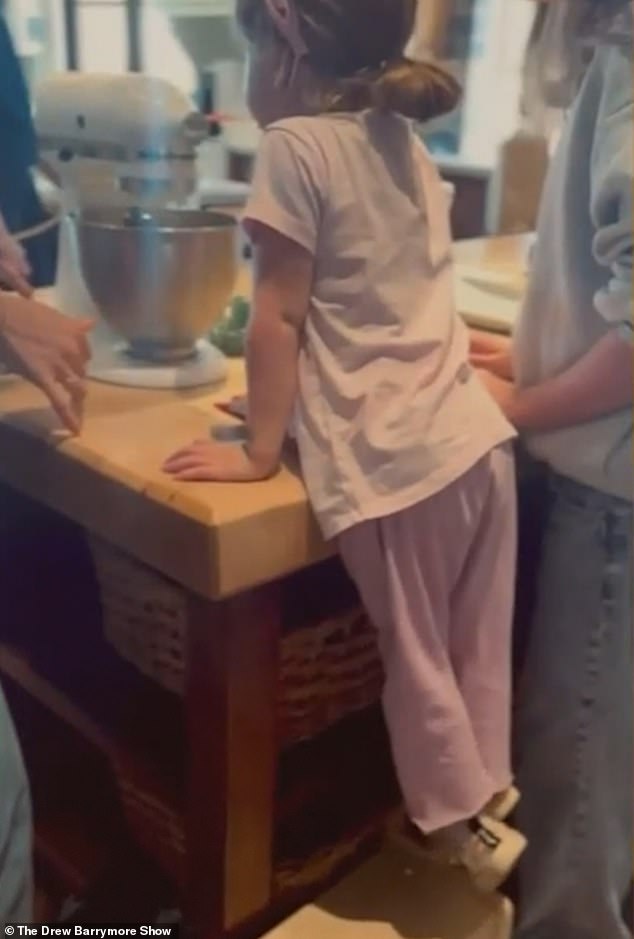
The Duchess has gone to great lengths to portray the preserve as an artisanal product. There was an enchanting video posted to her Instagram Stories showing a bubbling pot of the jam and featuring four-year-old Lilibet
Meghan’s first batch of products, launched on April 2, was handled by Snow Commerce, and shipped out of a massive FedEx centre in Marion, Illinois, 2,000 miles from Montecito. Robots ‘pull’ the products from the shelves in the centre where 280 employees work in four shifts around the clock.
A source at the facility said: ‘You’re never going to find anyone who handles Meghan’s jam. It’s all automated.’
Eric Schiffer, from Reputation Management Consultants, says: ‘In Meghan’s case, you have a very high-profile person who has carefully crafted an image around her products both on her TV show and on social media.
‘Jam is central to her brand. If you look at her social media posts it’s all about the jam and bubbling pots on the stove while her daughter stands beside her. It’s cute and wholesome.
‘She’s been effective in her messaging, particularly with Americans, who are more naive than the Brits.
‘The cornerstone with any celebrity brand is trust.
‘I’m not suggesting Meghan is doing anything wrong – all celebrities create an illusion and that’s part of the game – but she’s under more scrutiny than most.
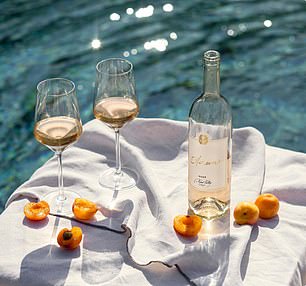
Meghan’s As Ever rosé is produced by a vineyard which also makes award-winning wines for superstar singer Barry Manilow, the MoS can reveal
‘She’s someone whose version of the “truth” has been challenged in the past. You only have to remember the Queen saying, “recollections may vary” [when Meghan aired her grievances about the Royal Family during an Oprah Winfrey interview in 2021].’
In short, Schiffer argues that ‘secrecy causes mystery and intrigue. But it can also backfire’.
… but we do know where her rosé comes from
Meghan’s As Ever rosé is produced by a vineyard which also makes award-winning wines for superstar singer Barry Manilow, the MoS can reveal.
Fairwinds Estate in Napa Valley was nearly destroyed by a wildfire in 2020, but has been rebuilt thanks to its focus on high-profile collaborations with celebrities and sports teams.
It is not known how much Meghan’s wine, pictured right, will cost – which goes on sale on July 1, Princess Diana’s birthday – but she joins a line of celebs who have cashed in with exclusive drinks.
Brad Pitt’s Miraval rosé empire is now valued at $200 million and George Clooney sold his CasaAmigos tequila brand for $1billion to drinks giant Diageo.
Fairwinds’ cellar master Troy Harbison said: ‘For a while we weren’t sure if the winery would survive. The owners had the idea of working with celebrities and sports teams to make their own line of wines, and it took off.’
Additional reporting: Peter Sheridan












